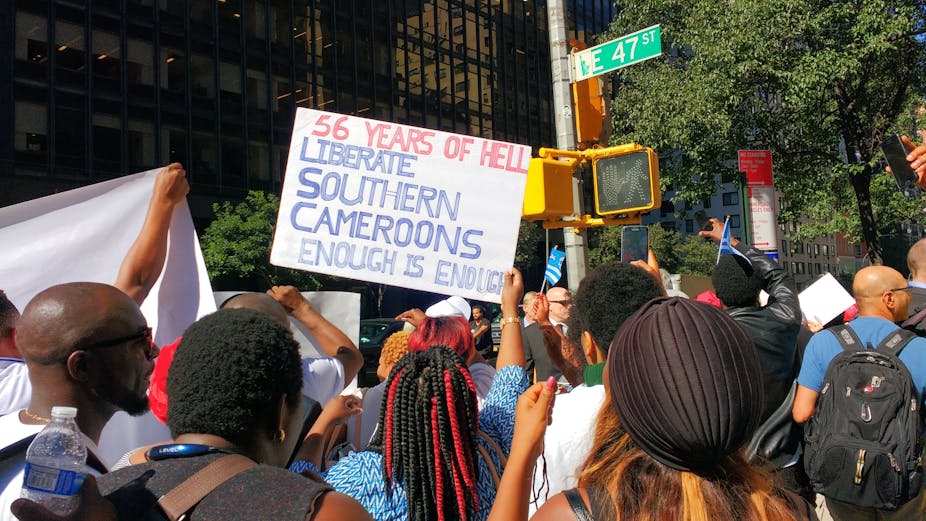Cameroon has been a member of the African Growth and Opportunity Act (AGOA) initiative since it was launched in 2000. AGOA is a preferential trade programme which allows a set of eligible products from designated African countries into the US market.
Its main objective is to promote economic development through increased trade and investment between the US and sub-Saharan Africa. Cameroon has benefited a great deal. In 2015, it made USD$133 million in overall export trade. Cameroon’s main exports to the US include petroleum, cocoa, rubber, timber, and coffee, while its main imports from the US include machinery, vehicles and chemicals.
But AGOA is not just a trade pact. It’s also a way of promoting democracy. It comes with strict eligibility criteria which require that countries maintain the rule of law. Countries must also commit to political pluralism, the right to due process, fair trial, and equal protection under the law. They must also cooperate in international efforts to eliminate human rights violations.
The AGOA legislation empowers the American president annually to determine which countries are still eligible for its benefits. If he determines that a country is not making progress towards meeting the criteria he can decide to suspend it from the agreement.
The history of AGOA is replete with cases of ejections and re-admissions. These have often been based on human rights and democracy related issues. For instance, in 2016 former US President Barack Obama ejected Burundi from the AGOA family.
He did this on grounds that the country had failed to establish the rule of law. His reasons included the continuing crackdown on opposition members, assassinations, extra-judicial killings, arbitrary arrests and torture.
South Sudan and The Gambia have also had their memberships terminated. The Democratic Republic of Congo and Swaziland too. Mali, Guinea Bissau and Cote d’Ivoire were ejected and re-admitted after making efforts to strengthen the rule of law.
So far Cameroon has had a stellar record. But given recent developments questions are being asked about whether or not it should still benefit from the scheme.
Troubles in Cameroon
Over the past year Cameroon has been engulfed in a crisis that has pitted the Anglophone part of the country against the central government whose policies are decried to favour its Francophone regions. The Anglophone regions to the west are former British mandated territories, while the Francophone regions in the east are former French mandated territories.
The unrest began in October 2016 with a protest against the overwhelming use of French in a country where French and English have equal status under the constitution.
What began as a disagreement over the use of language in courts and in the design of school curricula has slowly became a political battle for Anglophone secession. The calls for secession have been met with brutal repression by state security forces. Whenever the state and the secessionists have clashed state agents have used excessive force.
Multiple human rights abuses have been committed against unarmed civilian populations including killings, mass arrests and detention. Some pro-Anglophone Cameroonians have sought refuge in neighbouring Nigeria while others have been arrested and detained pending prosecution.
In January, the government shut down the internet in some Anglophone regions. The shutdown, which lasted for more than three months, was condemned as a violation of international human rights.
Because of this crisis one could rightly question whether Cameroon is still eligible for the AGOA trade benefits. Cameroon is not alone. Mauritania also faces ejection from the trade agreement for human rights abuses. The issue of modern-day slavery in Mauritania, which was once expelled before being re-admitted, has raised questionsabout its continued AGOA membership.
Eligibility in question
In October US Trade Representative’s Joseph Lighthizer announced new efforts to ensure that all countries receiving US trade benefits met the eligibility criteria.
By creating a more proactive process to assess eligibility the US will ensure that nonperforming countries are excluded from trade preferences. Although Lighthizer was referring to America’s Generalised System of Preferences – which is a different US preferential trade arrangement – it is likely that the review will also be applied to AGOA countries.
When it comes to Cameroon, the international community has called for dialogue before any action is taken. Opposition leaders are demanding the inclusion of all political and civil society stakeholders regardless of their religious beliefs or political opinions, including those who aspire for a return to federalism. Federalism was abolished in 1972 and replaced by a unitary state.
The Cameroonian government has shown its readiness to engage in talks with every stakeholder except the separatists who have been implicated in the November killings of four soldiers in the North-West region, and another four in the South-West region.
Current events have given the Cameroon government an opportunity to address issues of decentralisation which have remained dormant since the promulgation of the 1996 constitution. The constitution was supposed to grant a certain level of autonomy to local governments. Twenty years down the road decentralisation has remained a dead letter. This is why the latest separatist calls have taken root.
Dialogue is needed not only to end the brutal repression of the secessionist movement, but also to address the latent causes of the crisis. If the dialogue doesn’t take place Cameroon’s AGOA membership may be just another casualty of the ongoing Anglophone crisis.

